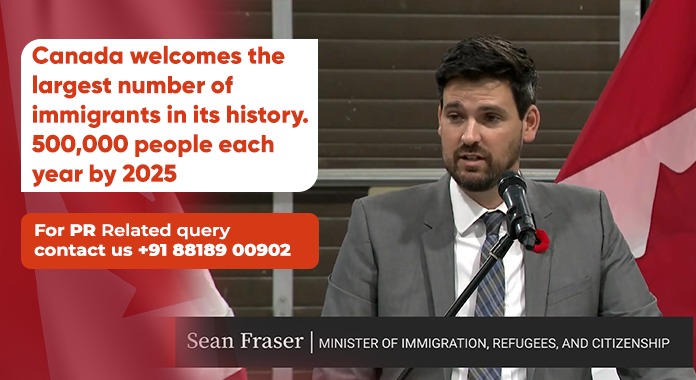Canada Endeavour to immigrate approx. 500,000 people each year by 2025
Recently, the immigration minister of Canada announced a new immigration plan to increase the number of people immigrating to Canada. He stated this plan is necessary to be implemented for Canada’s economic growth.
In the past three years, Canada has welcomed the most number of immigrants worldwide. To address a major labour shortage across the nation, the federal Liberal administration of Canada has outlined plans to increase the number of immigrants entering Canada, to see 500,000 people arrive each year by 2025.
Industry groups and others generally supported the concept, but there are concerns about how far it will go and whether it would even be possible to process this large number of applications.
This new strategy was unveiled by Immigration Minister Sean Fraser. Along with the goals for family members and refugees, the government is striving to admit more people in the country who have advanced and necessary skills.
The Canadian government has made provisions for the future to accommodate the considerable increase in immigration that is expected over the next few years. Canada intends to boost the number of immigrants to 500,000 annually by 2025 due to the labour deficit. As Canada’s workforce continues to age, the country is welcoming newcomers to the needed areas for economic growth.
The United Nations Refugee Agency (UNHCR) has supported Canada’s efforts in this direction. These efforts by the federal government are also appreciated by the Business Council of Canada.
But to address the continued skill and labour shortages, employers across the nation find it difficult to cover nearly one million job vacancies and require stronger targets for economic-class admissions. Furthermore, Tom Kmiec, a critic of conservative immigration policy also agreed with this expansion plan, but he doubted whether the government would be able to meet its own goals.
2.6 million Applications are waiting to be reviewed by immigration department staff, according to Kmiec. Approximately 615,000 of the 1.6 million requests come from individuals wishing for permanent residence status. He also stated that the government is trying to bring 500,000 immigrants but it may not be able to do so. And that’s unfair to those who are seeking to hear back within a decent amount of time.
Fraser supported the administration’s aims, stating he knew that recent expenditures, a hiring rush within the agency, and also adjustments to the way applications are handled, would deal with the issue and guarantee that individuals arrive on time.
History of Canada’s immigration
In the 90s era, the immigration rate was not much higher; approx. 90,000 people immigrated in the year 1984. Later, the government felt the shortage in labour and started setting targets to immigrate approx. 250,000 people.
The next Liberal administration carried on these goals but, as a result of a financial crisis, started to focus on welcoming more immigrants from the economic background and decreasing Canada’s proportion of immigrants from the family and humanitarian classes.
Before the current administration came into power in 2015, Canada admitted about 260,000 immigrants yearly. And Before the COVID-19 pandemic started in 2020, the targets were raised to 300,000 and then 340,000.
In 2020, it was challenging for the IRCC to handle applications due to border closures and other visa restrictions. Nevertheless, Canada beat its goal for immigration in 2021 and admitted 405,000 more permanent residents than ever before. Due to the Canadian Experience Class and Provincial Nomination Programs’ generous space allocations, these goals were met (PNPs).
In addition to labour shortages, Canada is currently experiencing a rare time of roughly one million available positions. Both present an opportunity for the nation’s expanding immigration goals.
This news comes after updated census data, released last month, showed that immigrants and permanent residents now make up 23% of the population.
Recent immigrants, defined as those who entered between 2016 and 2021, are, according to Statistics Canada, younger on average than the rest of the Canadian population and have played a significant role in filling many occupations in the Canadian labour market.
Four out of every five increases in Canada’s labour force between 2016 and 2021 were due to immigrants. Recent immigrants were largely chosen for their capacity to boost the country’s economy.
748,120 of the 1.3 million immigrants permitted into Canada during 2016 and 2021, or more than half, entered under the skilled migration category.
Why do people choose Canada for PR?
Canada always amazes the world with the intake of a large number of immigrants every year. It is the most preferable option for people who wish to settle in another country. It has become nearly perfect for people to choose to immigrate and become permanent residents there because of its hospitable personality, rapid economic growth, and straightforward immigration procedures.
Following are some key benefits of becoming a permanent resident in Canada:
Living and working right
In terms of quality of life and employment, Canada is considered the second-best nation in the world. It ranks among the best places to visit in terms of general sustainability, global impact, commercial activity, business, and overall quality of life. Any province or territory in Canada is open to you after you get a permanent resident card. You’re under no obligation to stay with a company, a position, or even a region.
Visa extension after 5 years
Canada’s permanent resident status card for the majority of people is valid for 5 years, however, some people only get the validity of 1 year. Additionally, there is no set restriction on the number of times you can extend your visa. The officer will examine your objective and experience to determine whether you have a good reason to stay.
Also welcomes your family
Your family can also reside in the country with you if it settles permanently. However, when you reach the age of 18, you may sponsor some residents. You can sponsor and support your parents and grandparents according to the Parent and Grandparent Program (PGP); they become permanent residents of Canada and all the benefits and amenities are available to them.
Free education
All children of legal citizens (before the age of 18) are guaranteed free education until Grade 12 by the Canadian government. In addition, permanent residents receive a significant discount on university tuition rates.
Free medication
The government of Canada provides all healthcare services to immigrants for free. Every individual with a valid Canadian permanent residency permit is entitled to free medical treatment, which includes all prescription medications that are covered by taxes. If you are a citizen and permanent resident of Canada, you can also apply for public health insurance.
Societal Advantages
To make their life fulfilling and comfortable, the government also provides access to jobs and other facilities that natives have. Retirement payments, disability benefits, and survivors’ benefits are some additional social advantages.
Freedom to Travel
The Canada PR card allows you to travel within, outside, or stay in Canada (several times). You are given the choice to relocate and establish yourself in a foreign place as well. All around the nation, you can look for new employment, a new opportunity, or other sources of income. The Canadian Charter of Rights and Freedoms Section 6 formalizes the right to travel
Ability to launch a business
Landed immigrants in Canada are also referred to as permanent residents. You are not required to be a Canadian to invest in a franchise or launch a new company under the provisions of Canada PR.
Sound Environment
Canada is considered the most peaceful nation by economists. As per character 6, all the legal protections will be given to the immigrants possessing permanent status in Canada. This consideration is given by many by keeping the safety factor in mind.
Access to Canadian citizenship
You may stay in Canada for five years after receiving permanent resident status. If you have stayed in a nation for 1095 days then you are eligible to get citizenship of canada. Merely Five years before the submission of your citizenship application will be considered valid.
How will this new immigration plan benefit applicants?
Permits with a validity date of 2024 will be provided to people who apply for an open work permit while waiting for their PR application to be processed. This will guarantee that all applications for permanent residence are completed before applicants must submit another application to extend their temporary status. Now, it is not mandatory that a person should reside in canada until the processing of their application.



